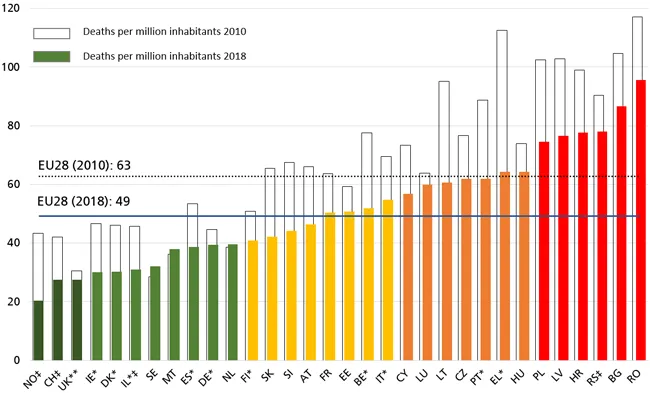The average sentence for causing death by dangerous driving in the UK is just four years – 62 per cent shorter than for manslaughter, according to road safety charity the IAM (Institute of Advanced Motorists). While the average sentence length of manslaughter is 6.6 years, those sentenced to prison for causing death by careless or inconsiderate driving are given an average sentence of 1.3 years. Causing death by careless driving when under the influence of drink or drugs has an average sentence of 4.3 years
July 13, 2012
Read time: 2 mins
The average sentence for causing death by dangerous driving in the UK is just four years – 62 per cent shorter than for manslaughter, according to road safety charity the IAM (5125 Institute of Advanced Motorists). While the average sentence length of manslaughter is 6.6 years, those sentenced to prison for causing death by careless or inconsiderate driving are given an average sentence of 1.3 years. Causing death by careless driving when under the influence of drink or drugs has an average sentence of 4.3 years.
Fifty-three per cent of those convicted of causing death or bodily harm through driving offences were sentenced to immediate custody (260 people) in 2011/2. This has dropped from the 83 per cent who were sentenced to immediate custody in 2001.
Fines for drink driving are also lower in real terms than they were ten years ago, showing a 12.3 per cent decrease. Meanwhile, the average fine for careless driving is 27 per cent less in real terms than it was in 2001. Dangerous driving is the only area with tougher fines: the average fine is £518 (US$800), some 30 per cent more in real terms than in 2001.
As IAM chief executive Simon Best points out, the organisation recently discovered that the number of prosecutions for motoring offences has fallen from one million in 2010 to 888,000 in 2011, a drop of 12.6 per cent. “Now it is clear that drivers are also receiving short sentences for some of the most serious driving offences.
Magistrates are handing out fines for drink driving that are less than five per cent of the maximum amount possible, giving the message that drink driving only warrants a slap on the wrist. Only sentences that reflect the seriousness of the crime will act as a proper deterrent,” Best said.
Fifty-three per cent of those convicted of causing death or bodily harm through driving offences were sentenced to immediate custody (260 people) in 2011/2. This has dropped from the 83 per cent who were sentenced to immediate custody in 2001.
Fines for drink driving are also lower in real terms than they were ten years ago, showing a 12.3 per cent decrease. Meanwhile, the average fine for careless driving is 27 per cent less in real terms than it was in 2001. Dangerous driving is the only area with tougher fines: the average fine is £518 (US$800), some 30 per cent more in real terms than in 2001.
As IAM chief executive Simon Best points out, the organisation recently discovered that the number of prosecutions for motoring offences has fallen from one million in 2010 to 888,000 in 2011, a drop of 12.6 per cent. “Now it is clear that drivers are also receiving short sentences for some of the most serious driving offences.
Magistrates are handing out fines for drink driving that are less than five per cent of the maximum amount possible, giving the message that drink driving only warrants a slap on the wrist. Only sentences that reflect the seriousness of the crime will act as a proper deterrent,” Best said.






